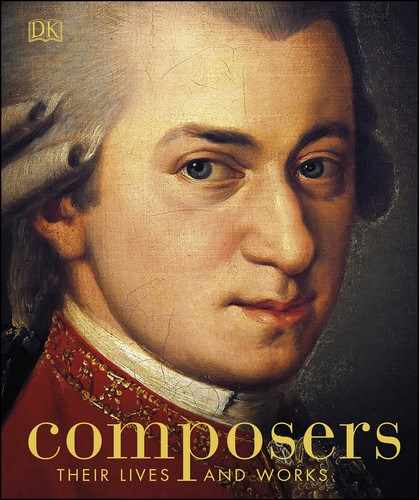Lili Boulanger
1893–1918, FRENCH
The tragically short-lived composer and pianist Boulanger was the first woman to win the coveted Prix de Rome award for composition. She is considered one of the 20th century’s most talented composers.

LILI BOULANGER, c. 1915
The young composer is pictured here during World War I, at the age of 21, two years after having won the Prix de Rome for her cantata Faust et Hélène and just three years before her early death.
IN PROFILE
Nadia Boulanger
A towering figure in Lili’s life, Nadia Boulanger (1887–1979) was a highly distinguished conductor and organist and one of the 20th century’s most influential teachers of composition. Like Lili, Nadia was tutored by Gabriel Fauré at the Conservatoire de Paris. She came second in the 1908 Prix de Rome with her cantata La Sirène. When her father died in 1903, Nadia's teaching became a vital source of financial support for the family. She went on to instruct numerous eminent composers, many from the US, including Aaron Copland and Philip Glass. After Lili’s death, Nadia was tireless in her promotion of her sister’s work.

NADIA BOULANGER CONDUCTING AN ORCHESTRA IN MANCHESTER, AGED 76
Marie Juliette Olga Boulanger, known as Lili, was born in Paris in 1893 to a musical family: her parents were notable musicians and her sister, Nadia, went on to become a famous conductor and tutor (see box). Lili grew up around leading musicians and intellectuals of the age, including the composer and close family friend, Gabriel Fauré, who became her piano tutor and had a major influence on her career.

VILLA MEDICI, ROME
As a winner of the Prix de Rome, Lili was invited to spend five years composing at this magnificent 16th-century villa. Ill health and the outbreak of war cut short her tenure, but it was here that she wrote her popular Cortège for flute and piano.
Overcoming hardship
Lili’s short life was marked by robust musical genius as well as physical frailty. At the age of two—by which time she could sing melodies by ear—she fell gravely ill with Crohn’s disease, which triggered pain and sickness in her life. However, Lili was precocious in her musical talents: she sang and also learned the piano, violin, cello, harp, and organ. Her studies were steered by Nadia, Fauré and, at the Conservatoire National de Paris, other leading musicians, including the composer Georges Caussade and the harpist Alphonse Hasselmans.
The death of her father when she was six is thought to have spurred Lili to start composing. Her earliest work was the simple and poetic Nocturne (1911) for violin and piano. At the age of 19, she won the prestigious Prix de Rome for her cantata Faust et Hélène (1913), composed in just four weeks. She was the first woman to receive the award. This marked the turning point in her career, securing her a scholarship as composer-in-residence at the Villa Medici in Rome as well as a publishing contract.
The influence of Fauré, Debussy, and Wagner is evident in Boulanger’s work, which also embraces religious themes (as in her psalm settings). Many of her major pieces were written during World War I, when she was often ill. Several of these are dark and brooding, as in Poème symphonique (1917) and Psalm 130, Du fond de l’âbime (Out of the depths, 1917–1918). By contrast, her Vieille prière bouddhique (1914–1917) and the sprightly D’un matin de printemps are more uplifting.
By 1918, although at a high point in her career, Boulanger was at a personal low, plagued by severe illness. Pie Jesu (for voice, strings, harp, and organ)—melancholic, sparse, beautiful—was completed on her deathbed. Her opera La Princesse Maleine (1916–1918) was unfinished at the time of her death at the age of 24.
“ Superior morally and spiritually … She became an example for me. ”
NADIA BOULANGER, ON HER SISTER, LILI
